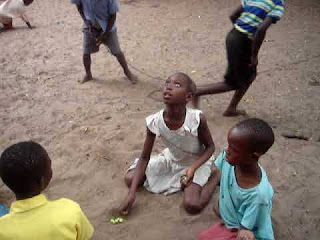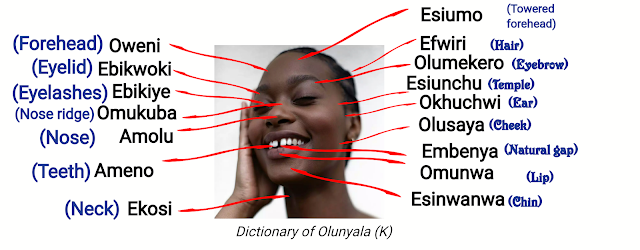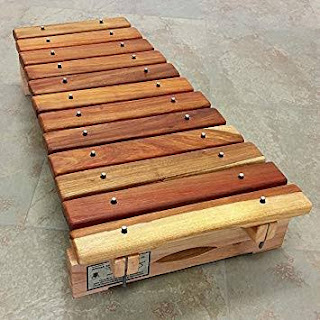ABANYALA BA KAKAMEGA: The Clan of Abamani
Abamani is one of the key clans among the Abanyala ba Kakamega. The story of their origin paints a picture of one clan that split into two then rejoined. Indeed, there exist other groups of related Abamani among other Luhya sub tribes of Kisa and Busia.
I have to state that the story of Abamani cannot be complete without making reference to the works of Gideon S Were: Western Kenya, Historical Texts, EALB, 1967.
Welcome to the story.
a) Forefathers of Abamani.
The forefathers of Abamani was a Masaai called Arap Kasiamani Re. 'Re' was an idiophone or soubd call he used while controling his heard of cattle. Arap Kasiamani Re came from Maasailand in present day Narok County. He left Masailand and passed through Kapsabet before reaching Nandi Hill near Kunjulu. He then moved on and build a home near Tiriki. He came with his brother-in-law, a husband to his sister called Amwiru, who was called Ebaba. Ebaba became the forefather of Abashirotsa (Kokwany)
After some time, he emigrated to Ebushimuli in Idakho where he built a home. He had a son called Arap Kute. Arap Kute sired Arap Kitui. Arap Kitui had two sons: Nderema and Matuli. The first son called Nderema was the ancestor of Abamani.
Nderema family, being the family of the first born, took on the name Abakisiamani which was shortened as Abamani to hide the Maasai identity. On the other hand, the second son called Matuli had four sons: Shimuli who founded Abashimuli; Omushisa who founded Abashisa; Bubu and Nyulia who founded Abakhobole. Abakhobole and Abamani always did everything together as two great brother families.
b) The first separation of Arap Kisiamani's children into clans
It is said that one day, after a feud over white ants (for feeding chicken), a woman belonging to the Abakhobole family scalded the dog of an Omushimuli family with hot water. As a result of this the Abashimuli threatened to go to war and kill Bubu and his family. In the spirit of peace, Bubu informed the family of Abashisa, family of Nyulia and the rest that he was migrating with his people. Since the families of Bubu, that of Nderema and that of Nyulia were united; they emigrated in solidarity and left that of Omushisa and Omushimuli in the land now known as Idakho. The three moved as a group.
Gideon Were (1967) says that from Idakho, the three families went to Eshibinga where they found the Ababwara. From there, they went to Ebulumbi where they came into contact with the Abakhoba. They then lived there for a short time. When they saw that they were becoming overpopulated in one area, they crossed the Olukose (Yala) River and went to Mukhokho (Nyamninia) where they came into contact with the Abarabulu sub group of the Abaluyia.
c) The final split of Abamani from Abakhobole
Abamani is a diverse clan found recorded among clans of various Abaluhya sub-tribes. They all had a great dispersal at Mukhokho due to overcrowding and internal family wrangles.
First, Gideon Were (1967) says tha the Nyulia remained at Nyamninia. Secondly, Bubu moved a bit farther to Ebunyala (in Ebukhobole) whereas Nderema went to Eshirembe. The people whom they found in these districts were the Abashituku, Abamutamba, Abatswayi and the Abamakhanywa sub-groups of the Abaluyia. Nderema and his party (the future Abamani) went farther down to Emurumba where they found the Abashitindi, Abamuswa, and the Abalukhobe.
That while in Emurumba, some family of Nderema separated and joined Abanyala. Others followed a son from the Abakhobole and went to Luoland. This group latter came back to join Abanyala. They were welcomed and the Abamani became one with Abanyala. They became assimilated as part of the larger group of Abanyala.
d) Origin of Abamani among the Abanyala ba Kakamega
Some years after the war of Esiatikho in 1710 ACE, the Abanyala emigrated under Munyala wa Mukhamba leaving some group of Abanyala under the Abanyala ba Busia group. Abamani were among the assimilated Abanyala who were left among Abanyala ba Busia. In soliderity with some of them who feared Omwami Mukhamba's policy on circumcision, remained in the cradle land of Abanyala. Mukhamba was of the Omuyemba-Omusaya of the Bagisu who believed in men facing knife called embalu.
However, during the Nyala-Bakhone war of 1800 ACE some families of Abamani emigrated and joined the group of Abanyala ba Kakamega. By this time, the Abanyala ba Kakamega were under the leadership of a grandson to Munyala Mukhamba called Mukhamba jnr in Mbaale. Mukhamba jnr was a son to Munyala Mukhe and her mother was Nabakholo from Abakholo clan.
Folklore has it that Abamani were among the group that came with the Abanyala wariors who had gone, as asked by Omwami Maganda, to aid Abaongo in fighting Abakhoone in Nyala-Khoone War of 1800 ACE. It is said that it is in this war that Miriri killed a one eyed legendary giant warrior of Abakhone called Mufulula at a place now called Buofu. The war lead to the first ever defeat and last dispersal of fierce Abakhone.
It was narrated that Abamani accepted to move because their Masaai history was similar to the history of another Masaai, Simbuchi omukeni wa Naisenya, the father of Abasenya- who was leading them. Also, they were fearing the retaliatory attack of Abakhone.
e) The story of two families of Abamani among Abanyala.
The first family consisted of the family of Abamani who had gone to Luoland under the leadership of Omukhobole. They had been cultured into the Luo culture of removing six lowers teeth and other practices from the Luos. That they also moved in with some Luo friends who got stuck in their culture.
The second family group is that which had remained within Luhyalands. This group was still practicing their circumcision and other cultural practices picked from the Luhyas.
Therefore, upon joining and being assimilated among the Abanyala, one group became referred to as the Abamani Abak(h)oole due to three reasons: one, their acquired culture of removing six lower teeth (okhukhoola) hence abakhoole. Two, for having followed the family of abakhobole to Luoland they came back as aba-Abakhobole. Lastly, for having come back from Luoland, they became known as Namukoole meaning those 'those who came back.' This last reason was embraced by the group.
The above lead to two praise names among Abamani. The Abamani of Nderema and Abamani abakoole who came back. Thus Nanderema and Namukoole.
f) Abamani in Navakholo
On arrival in Navakholo, they stayed near the present Malaha Market at a place named Nderema. It is from here that those of Abamani Abakoole dispersed off leaving Abamani ba Nderema.
Latter on, some of the Abamani ba Nderema moved to Bukhakunga and found some clans of Abasisa. They named the place Shimuli thinking they had found their cousins Abashimuli who remained in Idakho. This place was latter refered Shimuli sia Matayo after a World War veteran Matayo Cheng'ole (Makamanzi). This was to stamp it as Abanyala territory.
Later, the place was named Bukhakunga by the Kabras. Historically, Bukhakunga was a name for another different hill near the present Mugai area. It was just shifted for the sake of marking teritory. This explains why we have two places named Bukhakunga in Kabras.
However, the stay of Abamani in Shimuli Kabras was short lived after being scared by the Kabras making them to cross River Mukhulutsi to move South to other areas such as Shimuli (Simuli Wa Luka) and Matoyi near Sirigoi. Even after the emigration, the Abasisa still wanted the name Shimuli and not Bukhakunga.
The various families and other settlement areas of the Abamani clan wll be uploaded later once the information from the chairperson of Abamani becomes available.
That is the story. Good day.
I have to state that the story of Abamani cannot be complete without making reference to the works of Gideon S Were: Western Kenya, Historical Texts, EALB, 1967.
Welcome to the story.
a) Forefathers of Abamani.
The forefathers of Abamani was a Masaai called Arap Kasiamani Re. 'Re' was an idiophone or soubd call he used while controling his heard of cattle. Arap Kasiamani Re came from Maasailand in present day Narok County. He left Masailand and passed through Kapsabet before reaching Nandi Hill near Kunjulu. He then moved on and build a home near Tiriki. He came with his brother-in-law, a husband to his sister called Amwiru, who was called Ebaba. Ebaba became the forefather of Abashirotsa (Kokwany)
After some time, he emigrated to Ebushimuli in Idakho where he built a home. He had a son called Arap Kute. Arap Kute sired Arap Kitui. Arap Kitui had two sons: Nderema and Matuli. The first son called Nderema was the ancestor of Abamani.
Nderema family, being the family of the first born, took on the name Abakisiamani which was shortened as Abamani to hide the Maasai identity. On the other hand, the second son called Matuli had four sons: Shimuli who founded Abashimuli; Omushisa who founded Abashisa; Bubu and Nyulia who founded Abakhobole. Abakhobole and Abamani always did everything together as two great brother families.
b) The first separation of Arap Kisiamani's children into clans
It is said that one day, after a feud over white ants (for feeding chicken), a woman belonging to the Abakhobole family scalded the dog of an Omushimuli family with hot water. As a result of this the Abashimuli threatened to go to war and kill Bubu and his family. In the spirit of peace, Bubu informed the family of Abashisa, family of Nyulia and the rest that he was migrating with his people. Since the families of Bubu, that of Nderema and that of Nyulia were united; they emigrated in solidarity and left that of Omushisa and Omushimuli in the land now known as Idakho. The three moved as a group.
Gideon Were (1967) says that from Idakho, the three families went to Eshibinga where they found the Ababwara. From there, they went to Ebulumbi where they came into contact with the Abakhoba. They then lived there for a short time. When they saw that they were becoming overpopulated in one area, they crossed the Olukose (Yala) River and went to Mukhokho (Nyamninia) where they came into contact with the Abarabulu sub group of the Abaluyia.
c) The final split of Abamani from Abakhobole
Abamani is a diverse clan found recorded among clans of various Abaluhya sub-tribes. They all had a great dispersal at Mukhokho due to overcrowding and internal family wrangles.
First, Gideon Were (1967) says tha the Nyulia remained at Nyamninia. Secondly, Bubu moved a bit farther to Ebunyala (in Ebukhobole) whereas Nderema went to Eshirembe. The people whom they found in these districts were the Abashituku, Abamutamba, Abatswayi and the Abamakhanywa sub-groups of the Abaluyia. Nderema and his party (the future Abamani) went farther down to Emurumba where they found the Abashitindi, Abamuswa, and the Abalukhobe.
That while in Emurumba, some family of Nderema separated and joined Abanyala. Others followed a son from the Abakhobole and went to Luoland. This group latter came back to join Abanyala. They were welcomed and the Abamani became one with Abanyala. They became assimilated as part of the larger group of Abanyala.
d) Origin of Abamani among the Abanyala ba Kakamega
Some years after the war of Esiatikho in 1710 ACE, the Abanyala emigrated under Munyala wa Mukhamba leaving some group of Abanyala under the Abanyala ba Busia group. Abamani were among the assimilated Abanyala who were left among Abanyala ba Busia. In soliderity with some of them who feared Omwami Mukhamba's policy on circumcision, remained in the cradle land of Abanyala. Mukhamba was of the Omuyemba-Omusaya of the Bagisu who believed in men facing knife called embalu.
However, during the Nyala-Bakhone war of 1800 ACE some families of Abamani emigrated and joined the group of Abanyala ba Kakamega. By this time, the Abanyala ba Kakamega were under the leadership of a grandson to Munyala Mukhamba called Mukhamba jnr in Mbaale. Mukhamba jnr was a son to Munyala Mukhe and her mother was Nabakholo from Abakholo clan.
Folklore has it that Abamani were among the group that came with the Abanyala wariors who had gone, as asked by Omwami Maganda, to aid Abaongo in fighting Abakhoone in Nyala-Khoone War of 1800 ACE. It is said that it is in this war that Miriri killed a one eyed legendary giant warrior of Abakhone called Mufulula at a place now called Buofu. The war lead to the first ever defeat and last dispersal of fierce Abakhone.
It was narrated that Abamani accepted to move because their Masaai history was similar to the history of another Masaai, Simbuchi omukeni wa Naisenya, the father of Abasenya- who was leading them. Also, they were fearing the retaliatory attack of Abakhone.
e) The story of two families of Abamani among Abanyala.
The first family consisted of the family of Abamani who had gone to Luoland under the leadership of Omukhobole. They had been cultured into the Luo culture of removing six lowers teeth and other practices from the Luos. That they also moved in with some Luo friends who got stuck in their culture.
The second family group is that which had remained within Luhyalands. This group was still practicing their circumcision and other cultural practices picked from the Luhyas.
Therefore, upon joining and being assimilated among the Abanyala, one group became referred to as the Abamani Abak(h)oole due to three reasons: one, their acquired culture of removing six lower teeth (okhukhoola) hence abakhoole. Two, for having followed the family of abakhobole to Luoland they came back as aba-Abakhobole. Lastly, for having come back from Luoland, they became known as Namukoole meaning those 'those who came back.' This last reason was embraced by the group.
The above lead to two praise names among Abamani. The Abamani of Nderema and Abamani abakoole who came back. Thus Nanderema and Namukoole.
f) Abamani in Navakholo
On arrival in Navakholo, they stayed near the present Malaha Market at a place named Nderema. It is from here that those of Abamani Abakoole dispersed off leaving Abamani ba Nderema.
Latter on, some of the Abamani ba Nderema moved to Bukhakunga and found some clans of Abasisa. They named the place Shimuli thinking they had found their cousins Abashimuli who remained in Idakho. This place was latter refered Shimuli sia Matayo after a World War veteran Matayo Cheng'ole (Makamanzi). This was to stamp it as Abanyala territory.
 |
| Second World war veteran Matayo Cheng'ole with his wife Rodah Khanali and adopted daughter Ann-Loice Musimbi in Bukhakunga in 1981. |
Later, the place was named Bukhakunga by the Kabras. Historically, Bukhakunga was a name for another different hill near the present Mugai area. It was just shifted for the sake of marking teritory. This explains why we have two places named Bukhakunga in Kabras.
However, the stay of Abamani in Shimuli Kabras was short lived after being scared by the Kabras making them to cross River Mukhulutsi to move South to other areas such as Shimuli (Simuli Wa Luka) and Matoyi near Sirigoi. Even after the emigration, the Abasisa still wanted the name Shimuli and not Bukhakunga.
The various families and other settlement areas of the Abamani clan wll be uploaded later once the information from the chairperson of Abamani becomes available.
That is the story. Good day.



This history is quite informative but it has alot of gaps
ReplyDeleteTogether, we can fill the gaps left out by the elders from Abamani.
ReplyDeleteGood info . Am proud of those who come before me
ReplyDelete